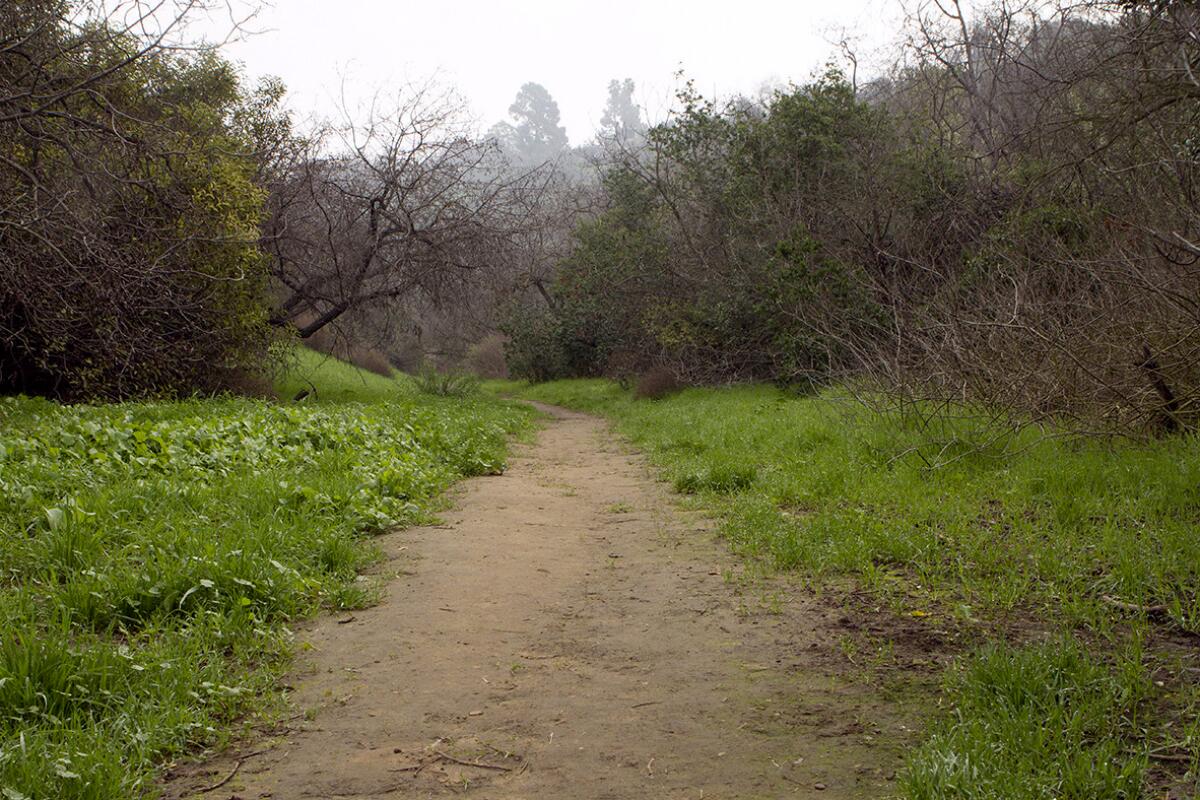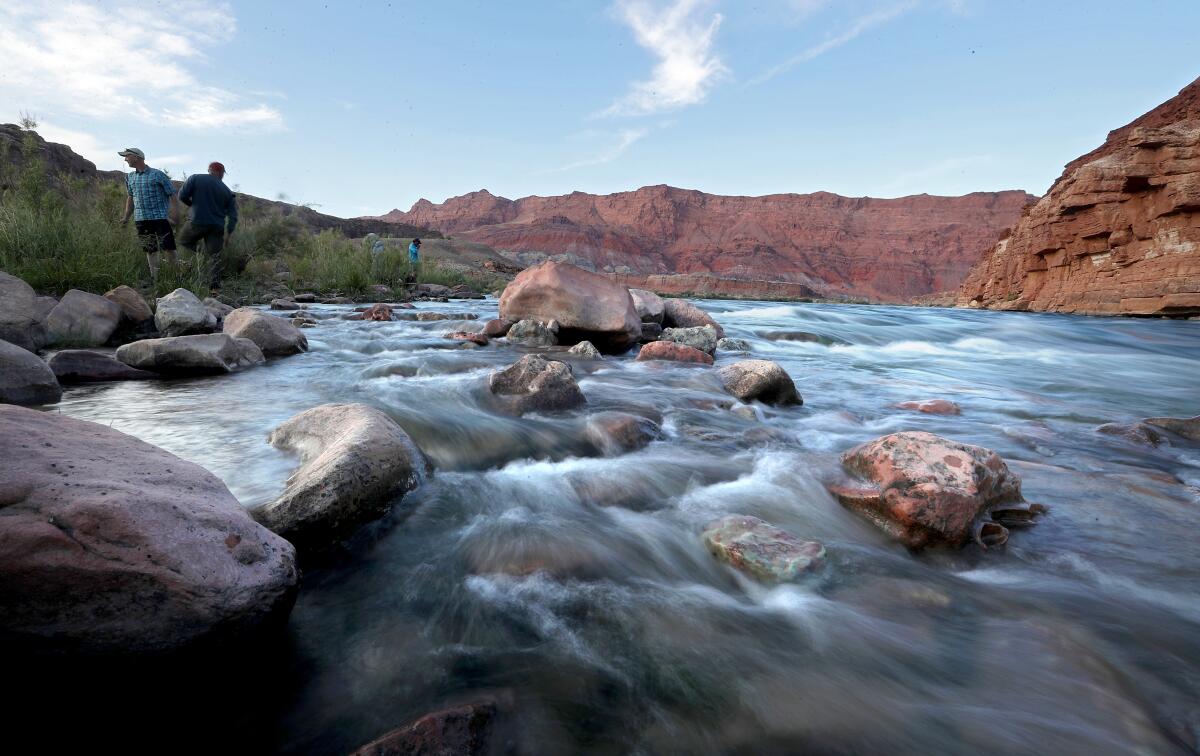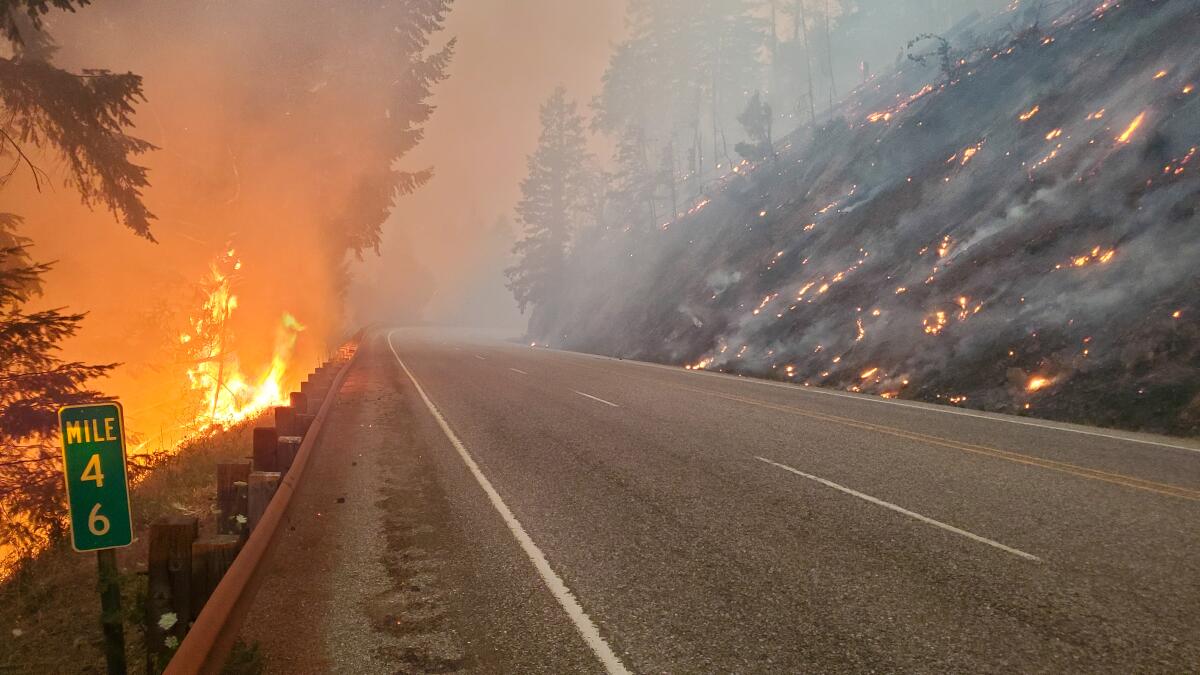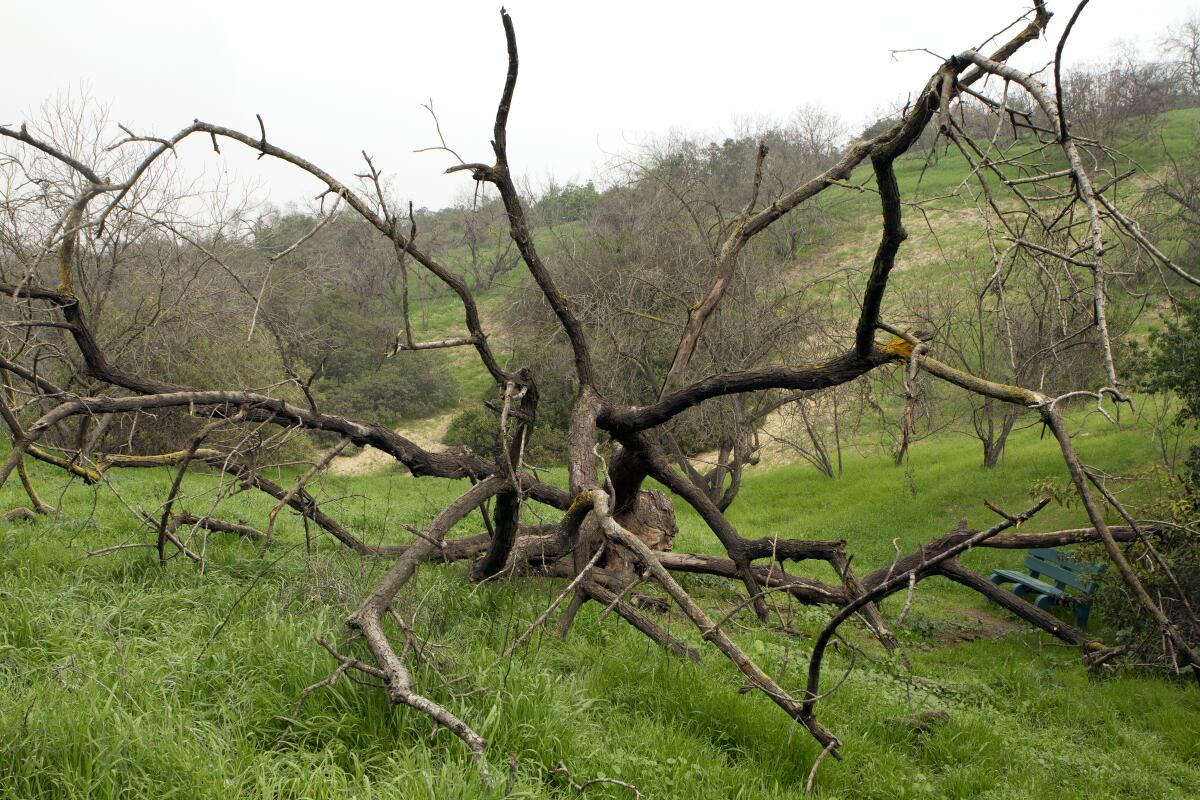Boiling Point: The fire right now

- Share via
This story was originally published in Boiling Point, a newsletter about climate change and the environment. Sign up here to get it in your inbox.
My name is Nancy Rivera Brooks, and I’m deputy business editor and editor of the Boiling Point newsletter. I’m filling in this week for Sammy Roth. Don’t worry, Roth stans — he will be back Thursday.
I live next to the rustic, Instagram-worthy Elyria Canyon Park, nestled in the urban environs of northeast Los Angeles. The place provides a look back at our city’s natural environment before development, featuring a California black walnut woodland and challenging hiking trails.
But all that beauty comes at a cost to nearby residents: the constant fear of fire.
I grew up across the street, so I learned at a young age how to tell what kind of smoke was in the air. Was it from a fireplace or barbeque? No worries. (How innocent we were in the 1960s and ’70s about the environmental effects of a blazing log on the fire or a nicely charred steak.) But if the smoke had that distinctive brush-fire smell, I needed to get my butt home and pack my favorite things, in case our family of nine had to evacuate.
So I found this piece by my colleague Haley Smith particularly scary. And really, we should all be scared.
Smith wrote that humanity’s relentless burning of fossil fuels has ensured that wildland fires will scorch ever-larger portions of California — perhaps as much as 52% more by midcentury, according to a study published in the Proceedings of the National Academy of Sciences. The study found that California wildfires consumed five times more area between 1996 and 2021 than in the 25 years prior, an increase attributed chiefly to climate change.
Moving on to another of the four elements ...
Smith also wrote about water, reporting that researchers aren’t exactly sure why ocean temperatures are skyrocketing. Most say the early arrival of El Niño against the backdrop of human-caused climate change is at least partly to blame for off-the-charts warming in the North Atlantic, which soared nearly 2 degrees above the mean in recent days. Other theories include an increase in heat-trapping water vapor tied to the Hunga Tonga volcano eruption and a change in shipping regulations that reduced sunlight-reflecting sulfur aerosols from the atmosphere.

The Times’ Ian James explored how Native tribes are seeking greater involvement in talks on the Colorado River water crisis. The federal government has started what’s expected to be a long, difficult process of negotiating long-term plans to address chronic water shortages along the river. The new rules for managing the river need to be in place by 2026, when the current ones expire. Leaders of tribes that depend on the river are pushing for more involvement in upcoming talks, saying the federal government hasn’t fully included them in key meetings with seven Western states.
This next story isn’t even remotely in the Western U.S., but who among us couldn’t be sucked into this tale about killer whales going “Moby Dick” on yachts off the Iberian Peninsula, written by my colleague Suzanne Rust? Since 2020, the orca pod has attacked more than 500 boats and sunk three. The pod has a growing number of fans transfixed by the idea that killer whales are seeking revenge against the rich and retribution against humans in general for all the woes we have caused this planet. But orca experts say revenge is probably not the motivation. Instead, there’s probably something fun and exciting to the whales about the sounds or waves made by these boats. It’s just an example of these curious, playful animals learning a new game and spreading it to friends and family.
So yay for the whales, and sorry, boat owners. Here’s something that might lift your spirits even more than frolicking, yacht-ramming orcas: Lake Oroville is 100% full as historic rain and snowmelt have revived California’s reservoirs. The Times’ Nathan Solis reports that the water level in the state’s second-largest reservoir has risen more than 240 feet thanks to more than 2.5 million additional acre-feet of water brought on by powerful winter storms and the melting of a historically deep snowpack. That puts the reservoir at 127% of its historical average for the date, state data show.
And on the opinion front ...
Columnist Michael Hiltzik penned a farewell to late Interior Secretary James G. Watt — or, if you’re a fan of url sleuthing, as I am, to “an-original-gop-environmental-vandal-james-watt.” Hiltzik said that Watt, who held the office from 1981 to 1983, should be remembered for “his legacy as a Republican ideologue on environmental policy.” Of special note was “his malign approach to California’s environmental concerns, particularly those related to offshore oil drilling.”
The Times’ Editorial Board urged lawmakers to pass SB 252, legislation by Sen. Lena Gonzalez (D-Long Beach) requiring pension funds CalPERS and CalSTRS to shed their investments in the largest fossil fuel companies by 2031 and stop renewing or adding to existing investments starting next year. The headline: “California should stop investing its retirement funds in fossil fuels. They’re risky and immoral.”
On that note, here’s what’s happening around the West.
TOP STORIES

A jury verdict in an Oregon wildfires case highlights the legal and financial risks utilities face amid climate change — with ominous implications for consumers, writes Claire Rush of the Associated Press. The jury found power company PacifiCorp liable for devastating wildfires in Oregon in 2020. Utilities say they’re taking steps to update, replace and even bury thousands of miles of power lines, while experts say utilities should’ve started that work long ago. But power customers are the ones who will end up footing the bill, analysts say.
The railroad industry has sued California to block new environmental rules requiring the phased replacement of diesel-powered locomotives by zero-emission versions, the AP’s Adam Beam and Josh Funk report. Trade groups say only the federal government can regulate railroads, because it’s an interconnected system crossing state lines. The industry says 25,000 diesel-powered locomotives would be forcibly retired before zero-emission locomotives are ready.
POLITICAL CLIMATE
There’s a lot going on in Montana, including the first U.S. constitutional climate trial, which kicked off in a Helena courtroom. There, young people testified about how global warming is affecting their lives, while lawyers argued that it’s the state’s legal responsibility to act. Dharma Noor of the Guardian has the details.
A new law passed by Montana Republicans that bans consideration of climate impacts in government decisions has had its intended effect. Gas power plant construction can move forward, writes Matthew Brown of the AP.
Speaking of electric utilities, Montana’s biggest power company wants the state’s public utilities commission to oppose a federal pollution rule that would cost a bunch of money to implement at the Colstrip coal plants, per Tom Lutey of the Billings Gazette.
THE ENERGY TRANSITION
Megan Rose Dickey of Axios writes that one-third of new vehicles registered in the San Francisco Bay Area in April were electric. Add hybrids, and the share rises to 53%. Nationwide, excluding the San Francisco area, 7.3% of new vehicle registrations were electric, and 9.3% were hybrid. Fossil fuels from transportation are one of the biggest drivers of emissions in the city, accounting for 44% of San Francisco’s greenhouse gas emissions, according to city data.
Here’s a very early sign that California regulators might be getting what they wanted when they slashed solar incentives: Of homes and businesses still choosing to go solar, many more are installing batteries, too, according to Cailley LaPara of Bloomberg.
That greenwashing lawsuit filed by a Glendale woman against Delta Air Lines could end up being a test case of corporations’ love of carbon offsets to improve their environmental footprint — or at least allow them to claim that they’re taking steps to become carbon neutral. Here’s the Bloomberg story by Kendra Pierre-Louis. And here is a 2021 L.A. Times investigation by Evan Halper into problems with how corporations use California’s carbon offsets market to outsource their obligations to fight global warming.
ONE MORE THING

Back to Elyria Canyon for a minute. I jettison all journalistic objectivity and risk increasing neighborhood traffic (sorry, Mt. Washington West Neighborhood Watch and Cypress Park residents!), but you really need to visit this place.
The Times’ retired car writer, Charles Fleming, happens to be famous among walking and hiking enthusiasts for his “Secret Stairs” books, covering Los Angeles and the East Bay cities of Berkeley and Oakland. There are no stairs of note at Elyria Canyon, but Fleming wrote this guide to my backyard park for my favorite newspaper, if you want more details.
We’ll be back in your inbox on Thursday. To view this newsletter in your Web browser, click here. And for more climate and environment news, follow @Sammy_Roth on Twitter.
Toward a more sustainable California
Get Boiling Point, our newsletter exploring climate change, energy and the environment, and become part of the conversation — and the solution.
You may occasionally receive promotional content from the Los Angeles Times.






